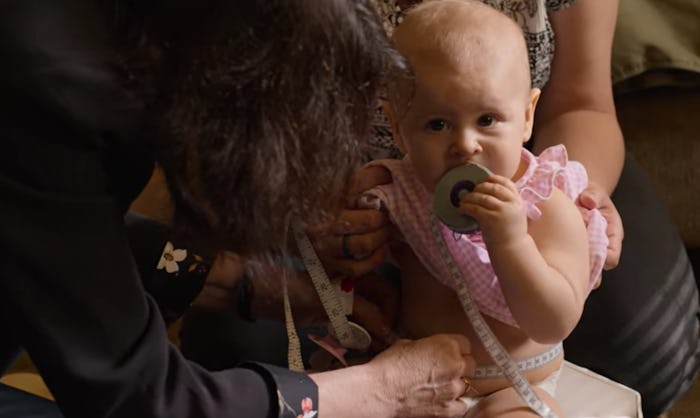Life
Are Growth Spurts Real? 'Babies' On Netflix Proves You're Not *Actually* Losing Your Mind
Babies are finicky creatures. Sometimes they’re ravenous, other times they won’t eat at all. One day they cry every hour on the hour, and the next, they’re as happy as a clam. Thanks to the Netflix docuseries Babies, we can now confirm what we've suspected all along: behavioral-changing growth spurts are real and you're not just losing it from lack of sleep.
Episode 3 of the new series focuses on a baby's development as they learn to crawl. To better understand how a baby's skills progress over time, Babies enlists the help of three child development experts including Dr. Michelle Lampl, Ph.D., M.D., director at the Center for the Study of Human Health at Emory University.
In the episode, Lampl explains how growth spurts impact a baby's development and how this might lead to the fussiness and mood shifts that many parents notice. (Cue desperate parents everywhere sighing with relief after yet another unexplained sleepless night.) Lampl's research shows that these behaviors are reactions from the general discomfort of rapid development in short bursts of time.
In an email interview with Romper, she explains that growth spurts are responsible for the erratic sleeping, crying, and feeding behaviors we see in babies. It's comforting for parents to know that it's not you —it's them. "The knowledge that a baby is having a growth spurt can promote confidence in parenting skills," Lampl says. "Offering their baby extra feedings, comfort and compassionate support during these difficult times provides babies the benefits of better parenting."
Have you ever stood in the pediatrician's office, stared at your baby's growth chart, and wondered how they seemed to have suddenly grown a foot overnight despite the chart showing a smooth, steady curve of growth? I definitely have. Lampl's research shows that these bursts of growth are not all in your imagination.
Babies grow faster in the first year of life than they ever will again, and during the infant stage, their abilities seem to change daily. After studying a number of babies’ growth and having their parents document their behavior patterns over time, Lampl concluded that the best way to prove these behaviors follow the pattern of growth spurts was to document their length each day. After doing this experiment, her findings showed that babies' major growth days were spaced out as opposed to constant.
This idea that babies grow in spurts was initially criticized by child development experts because it challenged the old school of thought that babies grow continuously at the same rate over time, as Lampl explains in the docuseries. "By the time my research on growth spurts was published I was not surprised by the criticism, as I knew it was an upending departure from long-held scientific beliefs," Lampl tells Romper.
Before you breathe too big a sigh of relief, Lampl explains that these growth spurts do not end with babyhood the way that diaper changes and nighttime feedings do. "Parents can expect to deal with growth spurts until their child completes their growth," Lampl tells Romper. "Growing occurs in spurts at all ages."
While you may be able to better decipher what your child needs as they grow and learn to communicate during these growth spurts, challenges will still present themselves. "Parents continue to be confronted by sudden outbursts of irritability in the form of temper tantrums, impatient and surly behavior, accompanied by changes in appetite, sleep patterns, and illness onset," she says.
If you have ever been warned by a parent of older kids that your grocery bill will double by the time you have teenagers, Lampl's research backs up the need to heed these friendly warnings. "Parents can expect to face the sudden need to replace outgrown shoes and pants as well as replenish the pantry," she says.
As a mom of two elementary-school-aged boys, I guess you can find me clipping coupons and scouring sale ads for the next eight to 10 years.
Experts:
Dr. Michelle Lampl, Ph.D., MD, director at the Center for the Study of Human Health at Emory University
